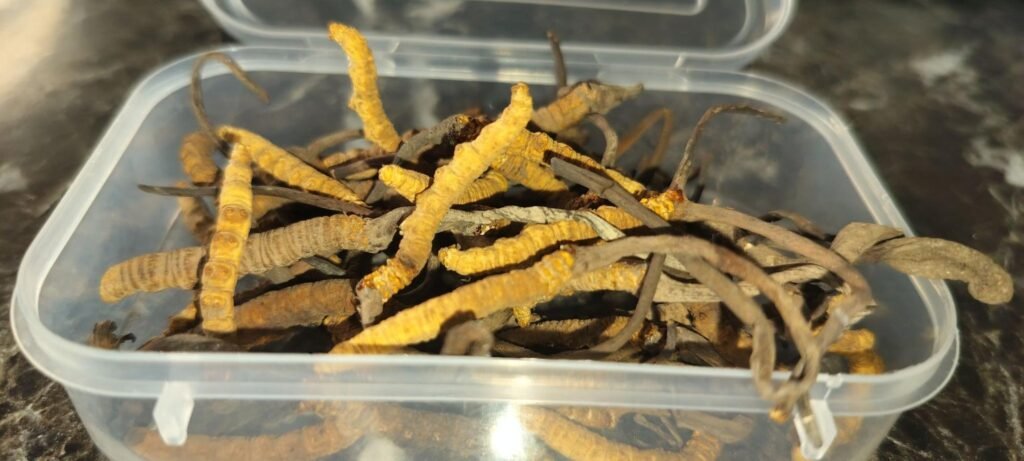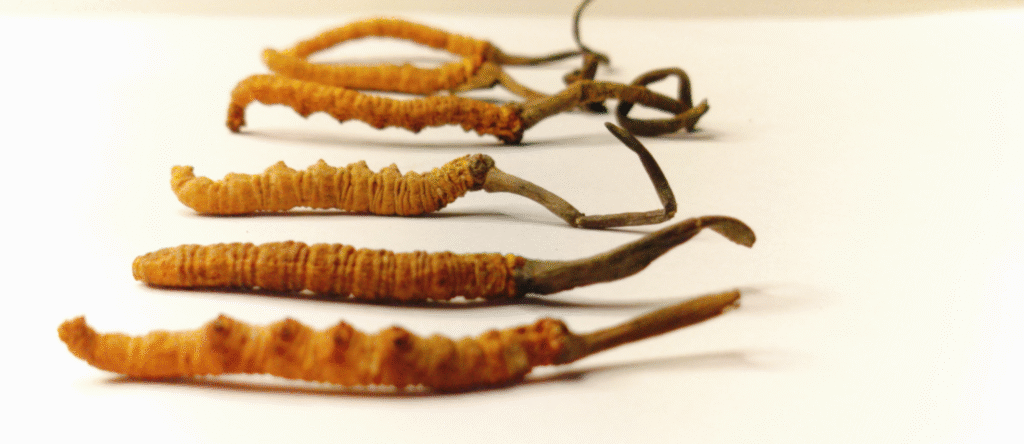- cordycepsfuel@gmail.com
- Dighi Kala West, Hajipur, Bihar-844101, India

The world of natural medicine has long praised the mysterious fungus known as Cordyceps, especially the wild variety called Yarsagumba Cordyceps Sinensis. Found at high altitudes in the Himalayas, this unique fusion of fungus and caterpillar has been used for centuries in Traditional Chinese and Tibetan medicine. While it’s widely known for boosting energy, stamina, and immunity, recent scientific attention is turning toward its potential to support neurological health—particularly in Alzheimer’s and Parkinson’s disease.
🌿 What Is Cordyceps Caterpillar Fungus?
Cordyceps Caterpillar Fungus—also known as Yarsagumba Cordyceps Sinensis—is a rare parasitic fungus that grows on ghost moth larvae in the Himalayan regions of India, Nepal, Bhutan, and Tibet. This bioactive fungus has gained global recognition for its adaptogenic properties, helping the body resist stress, improve oxygen utilization, and enhance overall vitality.

More recently, researchers have started investigating its neuroprotective potential. Could this ancient natural remedy hold modern-day promise for neurodegenerative disorders like Alzheimer’s and Parkinson’s?
🧠 How Cordyceps May Support Brain Health
The two major mechanisms by which Cordyceps Caterpillar Fungus supports brain health include:
1. Antioxidant and Anti-inflammatory Action
Oxidative stress and chronic inflammation are significant contributors to neurodegeneration in diseases like Alzheimer’s and Parkinson’s. Cordyceps contains potent antioxidants such as cordycepin and polysaccharides, which can help neutralize free radicals and reduce inflammation in the brain.
A study published in the Journal of Medicinal Food reported that Cordyceps extract decreased markers of oxidative damage and enhanced antioxidant enzyme activity in brain cells.
2. Neuroprotection and Neuronal Growth
Cordyceps has been shown to protect nerve cells against damage and stimulate the growth of new neurons. This could be especially beneficial in Parkinson’s disease, where the loss of dopamine-producing neurons in the brain leads to movement disorders.
Some research in animal models shows that Yarsagumba Cordyceps Sinensis can increase brain-derived neurotrophic factor (BDNF), a protein essential for brain plasticity and repair. Enhanced BDNF levels may support cognitive function, memory retention, and emotional regulation.
🧬 Cordyceps and Parkinson’s Disease
Parkinson’s is characterized by tremors, stiffness, and difficulty with balance due to the loss of dopamine in a part of the brain called the substantia nigra. There is currently no cure, only medications to manage symptoms.
Cordyceps’ ability to:
- Protect dopamine neurons
- Improve mitochondrial function
- Reduce oxidative stress
…makes it a promising natural candidate for supportive care in Parkinson’s.
While clinical trials in humans are still limited, preclinical studies suggest that Cordyceps may slow down disease progression and improve motor coordination.
🧠 Cordyceps and Alzheimer’s Disease

Alzheimer’s is primarily associated with memory loss, confusion, and cognitive decline due to the accumulation of beta-amyloid plaques and tau tangles in the brain.
Cordyceps Caterpillar Fungus may offer cognitive protection through:
- Reducing amyloid plaque formation
- Enhancing neurotransmitter activity
- Improving cerebral blood flow
A 2016 study demonstrated that cordycepin improved learning and memory performance in mice with Alzheimer-like symptoms. This aligns with traditional beliefs that Yarsagumba Cordyceps Sinensis enhances mental clarity and vitality.
🌏 Traditional Wisdom Meets Modern Research
For generations, healers in the Himalayan region have prescribed Yarsagumba Cordyceps Sinensis for memory enhancement, depression, fatigue, and age-related mental decline. Now, science is catching up.
Laboratory and animal studies support its neuroprotective effects, and although human trials are limited, the evidence is promising. It’s important to note that Cordyceps is not a cure for Alzheimer’s or Parkinson’s—but may serve as a complementary therapy to improve quality of life and slow disease progression.
✅ How to Use Cordyceps for Brain Health
If you or a loved one is considering Cordyceps Caterpillar Fungus for brain support, here are some tips:
- Choose wild-harvested Yarsagumba Cordyceps Sinensis for highest potency
- Start with a low dosage and gradually increase
- Consult a healthcare professional, especially if you’re on medication
- Look for products with third-party testing and clear origin (Indian Himalayas preferred)
Cordyceps is available in raw form, powder, capsules, or tinctures.
📦 Final Thoughts: A Natural Ally in Neurological Wellness
As neurodegenerative diseases rise globally, people are increasingly turning to holistic solutions to support brain function. Yarsagumba Cordyceps Sinensis, a treasured gift from the Himalayas, may offer real hope—not as a cure, but as a natural companion to modern treatment in Alzheimer’s and Parkinson’s care.
Backed by tradition and supported by science, Cordyceps Caterpillar Fungus continues to emerge as a powerful ally in preserving brain health, cognitive clarity, and aging with dignity.
Featured News
CordycepsFuel: Redefining Wellness with Wild Himalayan Cordyceps Mushroom
The Science Behind Caterpillar Fungus: Bioactive Compounds Explained
August 11, 2025
The Science Behind the Healing Power of Himalayan Caterpillar Fungus
August 11, 2025
Category
Have Any Question?
Feel free to message us anytime! We are available 24/7 and always happy to assist you. Whether you have questions about cordyceps or need help with your order, we are just a message away. Your satisfaction is our priority!
- +916207920700
- cordycepsfuel@gmail.com
